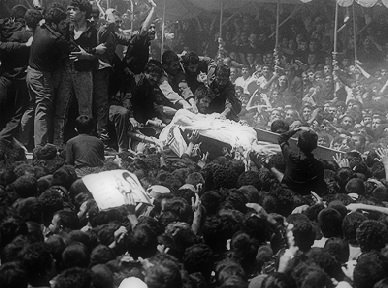Section 3 - James
In this section, Nafisi focuses on the difficult situations she encountered during the time of the Iran v. Iraq War when she was forced to choose between wearing a veil and continue teaching under the strict regulations, or keeping her identity and refuse to surrender to her changing surroundings.
Nafisi relates her real-life struggles to James's characters in his novels, Daisy Miller and Washington Square.
Daisy Miller is portrayed as a rebellious lady who died from the Roman fever despite Winterbourne's warning because she discovered Winterbourne's indifference towards her. Her death proved her devotion towards Winterbourne despite his betrayal. This fact establishes her heroine quality. Some of Nafisi's students thought that Daisy Miller was immoral and deserved her death in the end. Contrary to her students' beliefs however, Nafisi concentrates more on Daisy Miller's courage and the devotion she had in order to retain her sense of integrity. Like Daisy Miller, Nafisi possesses the courage and resistance towards her corrupt government that she is forced to live in.
In James's other novel, Washington Square, Dr. Sloper, a villain without empathy and compassion, fails to love his daughter, Catherine, and prevents her from marrying her beloved Morris Townsend. James gives his villain perfect, brilliant characteristics while he gives his heroine, Catherine Sloper, many negative qualities such as unattractiveness. The one positive trait that Catherine does posses however is the compassion she has towards her own identity. It is this compassion that distinguishes her from the ordinary and creates her identity. Nafisi has the same compassion towards her suffering students when they encountered countless unreasonable obstacles created by the regime. Her tone of compassion is present even in her description towards the end of the third section of the once powerful radical Muslim student who went insane and set himself on fire due to the government's betrayal. The story of Catherine Sloper connects to Nafisi and her students' lives in that they all live in an environment with a lack of empathy and freedom.
Power in one's life serves no long lasting significance because one person's diminutive power is always controlled by the government and can soon be taken away, just as the young martyr's rank and granted place in heaven were taken away as soon as he returned home from the war. On the other hand, one's integrity and individuality make up an important, influential human being. Just like Daisy Miller and Catherine Sloper, Nafisi and her students ultimately succeeded when they held on to their beliefs and their integrity even in their unjust environment.
Ayatollah Khomeini's Funeral

